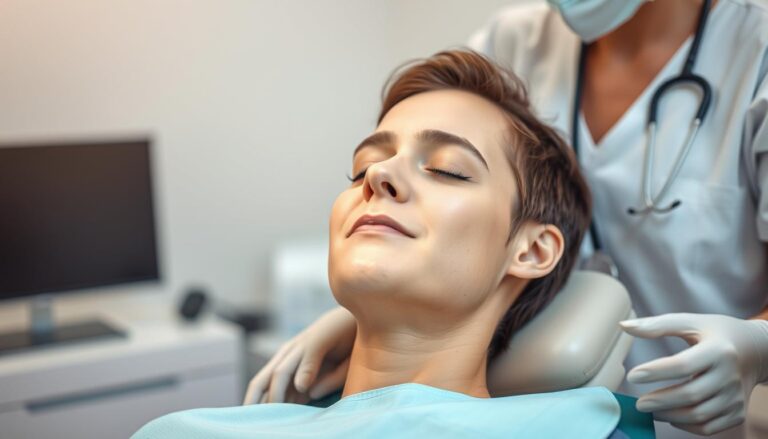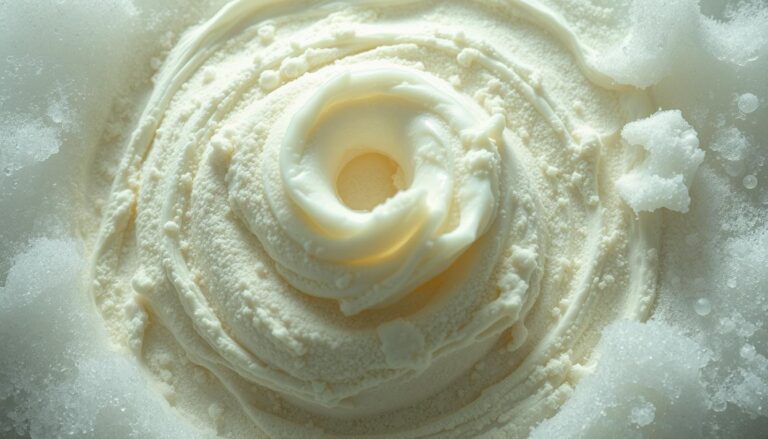Can I Eat Before My Dental Appointment?
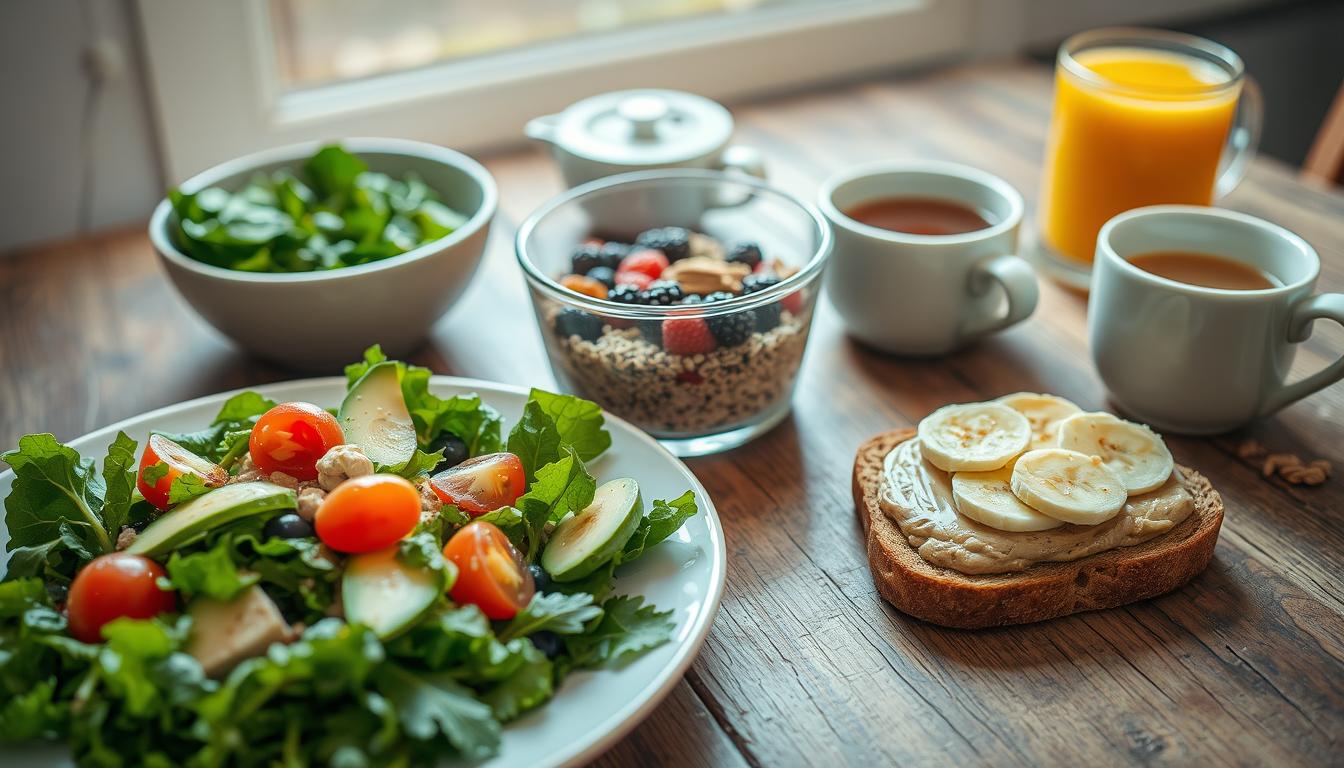
Is it ever smart to skip food right before stepping into the dentist’s office? Many individuals pause to ask themselves: Can I eat before my dental appointment?
A light meal can steady blood sugar and ease nerves for those who feel anxious. Routine check-ups often allow small snacks, while sedation or surgical procedures may call for fasting. Choosing a suitable time of day can minimize hunger or discomfort. Every patient is unique, so it is best to confirm specifics with a trusted dental professional.
Key Takeaways
- Light snacks can help avoid dizziness during simple procedures.
- Fasting is common for sedation or surgical treatments.
- Stick to calm and easily digestible foods before a routine visit.
- Morning appointments help some patients avoid feeling hungry.
- Always check with your dentist for personalized guidelines.
- Staying informed helps you prepare for each unique appointment.
Understanding Dental Appointments
Visits to a dental clinic can be simple or complex. Professionals first examine the mouth to find concerns. They then decide the best treatment. It’s important for patients to know how to prepare for these visits.
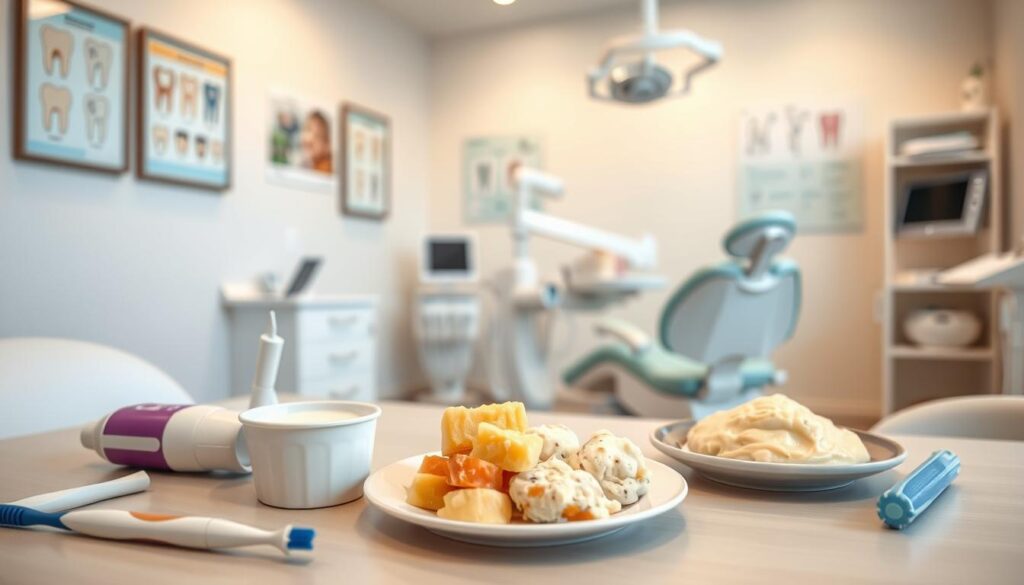
Types of Dental Procedures
Services range from cleanings to fillings and diagnostics. Some treatments, like root canals, need more time. Each procedure has its own schedule and equipment needs.
Importance of Appointment Preparation
Good preparation helps reduce stress, including meal planning. Patients often look up guidelines for eating before their visit. This helps everyone stay calm and ensures a successful treatment.
General Guidelines for Eating Before Appointments
Eating the right food before a dental visit can make you feel more relaxed and comfortable. A light, balanced meal is often recommended. It helps keep your energy up and prevents food from getting stuck between your teeth.
Choosing wisely can also help you communicate better with your dentist. This makes the whole experience smoother for everyone.
Timing of Meals
Eating one or two hours before your dental appointment is best. This time lets food digest and prevents stomach upset. It also gives you a chance to brush your teeth and remove any leftover food.
Some people prefer eating protein-rich foods like eggs or yogurt. They digest slowly and are less likely to cause irritation.
- Schedule meals so brushing can follow immediately
- Opt for light items that offer both nutrition and easy clean-up
Types of Foods to Avoid
Sticky foods like caramel, chewy candy, or dense protein bars can stick to your teeth. Poppy seeds or tough meats can also leave behind extra debris. Drinks that stain, like coffee, can discolor your teeth.
Being mindful of these foods helps keep your mouth clean and fresh. It’s all about making the right choices for your dental visit.
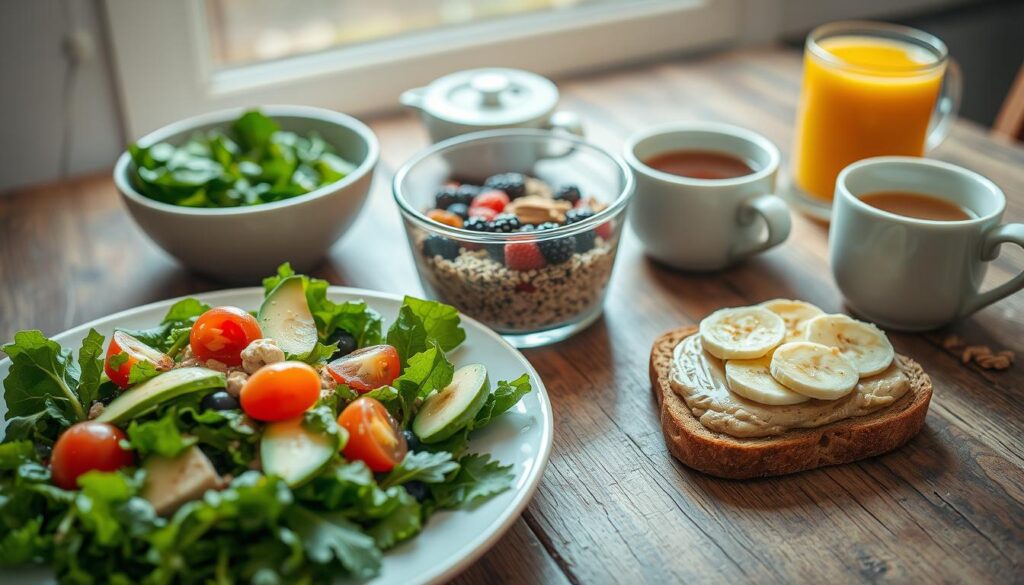
Procedure-Specific Dietary Recommendations
Some people wonder if they can have a quick snack before a dentist visit. This advice is about different treatments and how they affect what you can eat before going to the dentist. Being careful helps you stay comfortable and safe.
Cleanings and Routine Check-Ups
For treatments without sedation, light meals are usually okay. Choose a snack that’s not too sticky or smelly. This helps keep your teeth and braces clean and prepares your stomach for fluoride treatments.
Extractions and Surgical Procedures
For more serious treatments, you might need to fast. Eating too much can make you feel sick, which is worse when you’re under anesthesia. Following these rules can make your recovery faster and safer. Many patients check the American Dental Association’s website for safe eating tips before their visit.
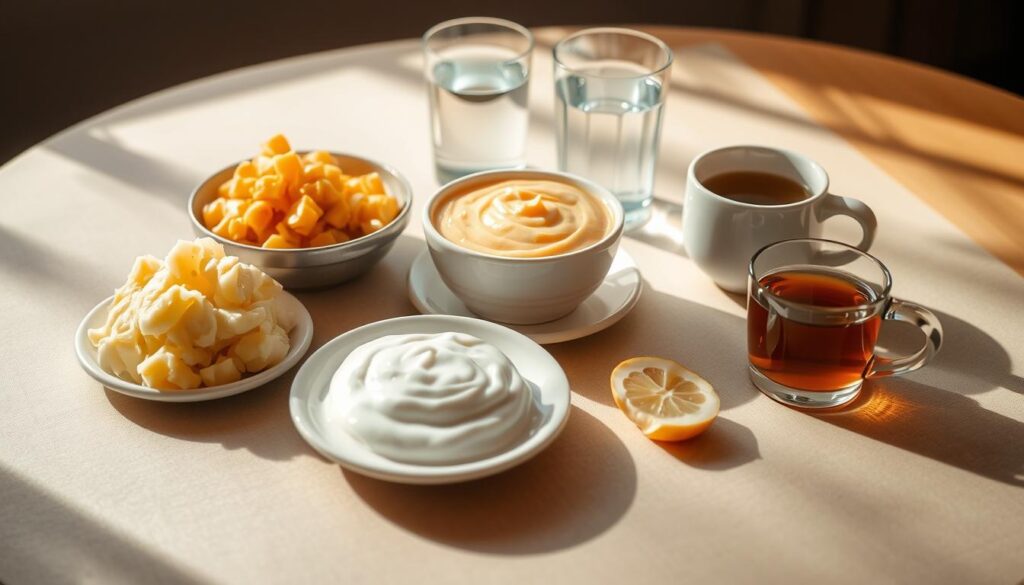
| Procedure Type | Diet Recommendation |
|---|---|
| Cleanings & Check-Ups | Light meal or snack |
| Extractions & Surgeries | Partial or full fasting |
The Impact of Anesthesia on Eating
Anesthesia changes how people eat before a dental visit. Different sedation levels need different eating plans. The American Dental Association gives advice based on each patient’s needs.
Local Anesthesia Considerations
Local anesthetics numb specific areas without strict diet rules. A light meal before can keep blood sugar stable and nerves calm. Some choose light snacks to avoid nausea or dizziness, making treatment smoother.
General Anesthesia Considerations
General anesthesia requires a stricter diet plan. Doctors often advise skipping food for at least six hours beforehand. This lowers the risk of choking and helps sedatives work better. Avoiding heavy meals also reduces digestive stress.
Here’s a quick guide:
| Type of Anesthesia | Suggested Fasting | Main Reason |
|---|---|---|
| Local | Short or none | Reduce chance of upset stomach |
| General | 6+ hours | Prevent aspiration during sedation |
Communicating with Your Dentist
Talking openly helps create a plan that fits your needs. Many dentists recommend extra time to discuss x-rays, sedation, and what to eat before your visit. If you want to know what foods are okay, talking about it ahead of time can make you feel more at ease.
Questions to Ask Before Your Appointment
Asking about when to eat can help avoid discomfort. Some might need to fast, while others can just change their diet. Important things to ask include:
- Allergies or intolerances linked to anesthesia
- Interactions between current medications and antibiotics
- Prior digestive challenges that could influence sedation
Importance of Following Professional Advice
Dentists consider your health history when giving advice. They might suggest certain foods to keep your blood sugar stable and avoid side effects. Listening to their advice can make your visit more comfortable.
| Key Discussion Points | Benefits |
|---|---|
| Meal Timing | Reduced chance of nausea or dizziness |
| Potential X-Rays | Clearer insight into underlying issues |
| Sedation Options | Lower anxiety and better comfort |
| Medication Interactions | Fewer adverse reactions or complications |
Special Dietary Needs and Considerations
Different health scenarios need careful menu planning, like pre-dental nutrition tips. Many people have special body needs. They need help from their healthcare providers and dental teams.
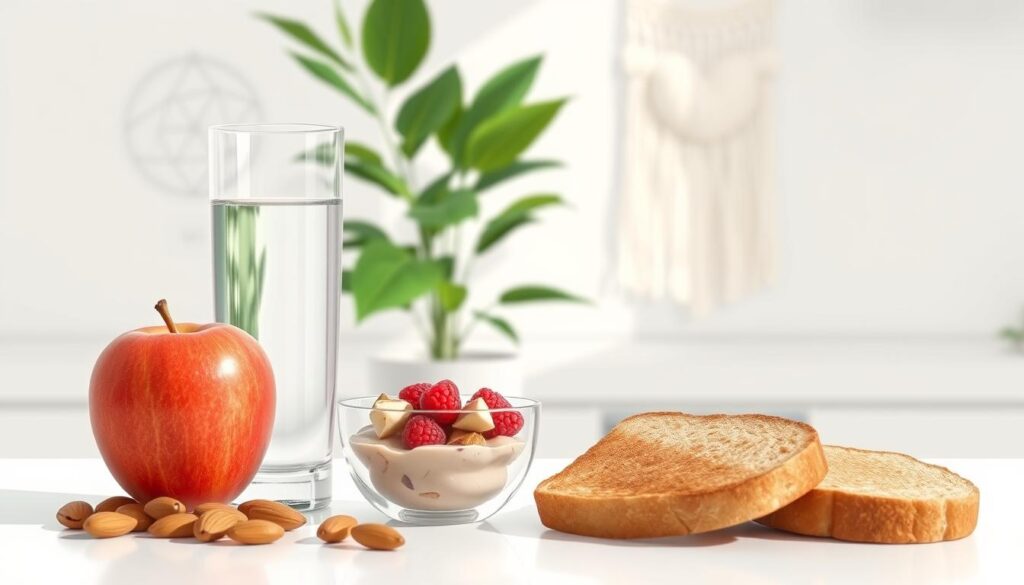
Pregnant Patients
Women expecting a baby might want to eat small, frequent meals. This helps keep their energy steady. Foods like oatmeal or yogurt are good because they don’t cause blood sugar to drop suddenly.
Dentists might suggest eating at certain times. This can help avoid discomfort during dental visits.
Patients with Medical Conditions
Some health issues, like diabetes or stomach problems, need special diets. Keeping blood sugar stable is important to avoid risks during dental visits. Working with a primary care doctor can help find safe eating times before dental cleanings or treatments.
Here’s a quick look at some dietary considerations:
| Condition | Dietary Focus | Sample Choices |
|---|---|---|
| Pregnancy | Frequent light meals | Whole grains, fruit smoothies |
| Diabetes | Stable blood sugar | Lean proteins, vegetables, nuts |
Common Myths About Eating Before Dental Visits
Many people think they should not eat before going to the dentist. They believe it helps avoid problems during their visit. But, eating a light meal can actually make you feel more comfortable. It keeps your hunger away and helps keep your mood stable.

Debunking Misconceptions
Some think you must fast before every dental visit. This idea comes from mixing up dental care with other medical procedures. But, for most simple treatments, a small, balanced meal is okay.
- Light meals can lessen stress
- Nourishing snacks promote stable energy
- Fasting is only essential if sedation is planned
Understanding Dental Health and Nutrition
Eating well is key to keeping your mouth healthy for a long time. Foods rich in protein and calcium help your teeth stay strong. Fruits and veggies are good for your gums. The best foods to eat before the dentist are soft and full of nutrients, without irritating your mouth.
| Myth | Truth |
|---|---|
| Always skip meals | Eating lightly is safe for routine check-ups |
| All procedures require fasting | Only select treatments need strict fasting rules |
The Role of Hydration
Drinking water helps keep your mouth moist and healthy. It supports saliva production, which fights off bacteria. A hydrated mouth is better for dental care.
Sipping water can also help if you ate before your dental visit. It washes away any food bits that might be left behind.
Importance of Staying Hydrated
Drinking water often keeps your mouth’s pH balanced. It also helps dilute acids, which can harm your teeth. This can reduce the chance of cavities and tooth decay.
Dentists might suggest drinking water before your visit. They want to keep your mouth moist for a smoother check-up. But, they usually don’t limit how much water you can drink, unless it’s for a sedation procedure.
Effects of Dehydration on Dental Health
A dry mouth can lead to bad breath and gum problems. Some dental procedures require you to follow strict hydration rules. It’s best to talk to your dentist about these rules, even if you’re just eating before your visit.
| Method | Advantage |
|---|---|
| Regular Water Sipping | Maintains saliva flow and comfort |
| Rinsing Mouth Pre-Exam | Clears residual particles from meals |
| Monitoring Fluid Intake | Supports consistent oral hygiene |
Knowing When to Fast
Some dental procedures need you to not eat or drink for a while. This is true for sedation, where you usually can’t eat solid foods for six hours. You might be allowed to drink clear fluids up to two hours before, but rules can change.
Partial fasting lets you have small amounts, like water, while total fasting means no food or drink at all. These rules help make the procedure safer. It’s important to check with your dentist for specific instructions.
- Surgeries that involve extensive oral work
- Deep sedation and anesthesia protocols
- Procedures requiring specialized pain control
Patients who plan ahead by clarifying fasting rules often enjoy smoother recoveries and fewer surprises.
Post-Appointment Eating Guidelines
Many dental patients wonder when they can eat a full meal after treatment. It’s important to protect sensitive gums or surgical sites to stay comfortable. Eating foods rich in nutrients helps your mouth heal and supports your oral health goals.
Recommended Foods After Dental Work
Soft foods are best for new fillings or extraction sites. Here are some easy-to-eat options:
- Pureed soups
- Mashed potatoes
- Scrambled eggs
- Steamed vegetables
- Smoothies
These foods are gentle on your mouth and help your tissues heal faster. Drinking plenty of water also helps clean your mouth and keeps it comfortable.
Foods to Avoid After Treatment
Some foods can slow down healing or dislodge clots. Avoid crunchy snacks, sticky candies, and spicy foods. They can irritate your mouth. Wait a bit before eating harder foods. Each person’s recovery is different, so check with your dentist for the right time.
Caffeine and Sugar: What to Consider
Caffeine and sugar can affect how you feel during a dental visit. Some people drink coffee or eat sweet snacks to feel better. But these choices might not be good for your teeth.
Does coffee make you more anxious before dental work? Are some treats harder to get rid of on your teeth? These are important questions when you’re getting ready for a dental appointment.
Effects of Caffeine Before an Appointment
Too much caffeine can make you feel jittery and nervous. It can also stain your teeth. If you’re getting sedation, cutting down on caffeine can make things easier.
Impact of Sugar on Oral Health
Sugar feeds the bacteria in your mouth that can harm your teeth. This can lead to cavities or make your teeth sensitive. Drinking water or unsweetened tea can help keep your mouth clean. Rinsing with water after eating sweets can also prevent plaque.
Preparing for Nerve Blocks or Sedation
Many dental visits need nerve blocks or sedation. These methods reduce pain and anxiety. It’s important to not eat too much before sedation.
Eating Guidelines for Sedation Dentistry
You might be allowed a light meal a few hours before. Oral conscious sedation requires fasting for six hours. This lowers the risk of stomach problems.
Water is okay in small amounts. But, the exact rules depend on the sedative.
Aftercare Instructions Following Sedation
After the procedure, you can eat normally if there’s no pain. Soft, nutrient-rich foods are best. They’re easy to chew.
Have someone with you if you’re feeling sleepy. They can help you get home safely.
Consult the chart below for a quick reference:
| Step | Guideline |
|---|---|
| Fasting Duration | 6 hours |
| Hydration | Small sips of water |
| Post-Procedure Meal | Resume once anesthesia wears off |
Adjusting Your Dietary Habits
Eating a variety of foods can help keep your teeth and gums strong. Foods like fruits, vegetables, and lean proteins are good for your mouth. Vitamins and minerals, such as calcium and vitamin C, fight tooth decay and keep gums healthy.
Long-Term Oral Health Considerations
Checking your diet regularly is important. It helps you make choices that keep your mouth healthy. Here are some tips:
- Eat snacks that are full of nutrients to strengthen your teeth over time.
- Try to avoid foods that are high in sugar or processed ingredients.
- Get advice from dental and medical professionals to fit your needs.
By sticking to these habits, you can protect your teeth and gums from problems.
Healthy Eating for Dental Wellness
Good nutrition is key for strong jawbones and healthy oral tissues. Vitamins play a big role in keeping your mouth healthy. They help build a strong foundation for your overall health.
| Nutrient | Benefit | Sources |
|---|---|---|
| Calcium | Strengthens tooth enamel | Dairy products, fortified soy drinks |
| Vitamin C | Promotes gum health | Citrus fruits, broccoli |
Conclusion: Best Practices for Eating Before Appointments
Dental visits have different needs. Some, like cleanings, let you have light meals. Others might need you to eat nothing at all. This section will help you feel sure about what to eat before your visit.
Summary of Recommendations
For non-sedation visits, light meals can make you feel better. Drink water to stay hydrated and avoid sticky or greasy foods. Getting enough sleep the night before helps manage stress and keeps your energy up.
- Eat small, balanced meals if not instructed to fast
- Avoid sugary snacks or drinks close to treatment time
- Follow guidelines for anesthesia or sedation fasting
- Discuss any medical concerns with the dental team
Importance of Personalizing Dietary Choices
No one rule fits everyone. Your health history, medical conditions, and medications are key. Some procedures need you to fast for hours, depending on the anesthesia.
Talking with your dentist about your needs is important. Healthy eating before your visit helps make it smoother. This approach makes your experience better and keeps your mouth healthy.

